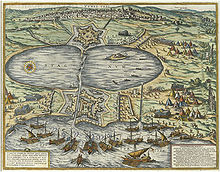- Abu Marwan Abd al-Malik I Saadi
-
Abd al-Malik
أبو مروان عبد الملك الغازيSultan of Morocco 
Abd al-Malik crushed the Portuguese at the Battle of Ksar El Kebir in 1578.Reign 1576 - 1578 Full name Abu Marwan Abd al-Malik I Saadi Died 1578 Successor Ahmad al-Mansur Dynasty Saadi Dynasty Father Mohammed ash-Sheikh Religious beliefs Islam Abu Marwan Abd al-Malik I (Arabic: أبو مروان عبد الملك الغازي), often simply Abd al-Malik or Mulay Abdelmalek, was the Saadi Sultan of Morocco from 1576 until his death right after the Battle of Ksar El Kebir against Portugal in 1578.
Contents
Saadi Prince
Abd al-Malik was one of the sons of the Saadi Sultan Mohammed ash-Sheikh, who was assassinated by the Ottomans in 1557 by order of Hasan Pasha, son of Barbarossa, as he was preparing for an alliance with Spain against the Ottomans.
One of his brothers Abdallah al-Ghalib (1557–1574) took the power and rose to the throne, but planned to eliminate his other brothers in the process. Abd al-Malik had to escape from Morocco and stay abroad until 1576, together with his elder brother Abdelmoumen and his younger brother Ahmed.[1]
Exile to the Ottoman Empire (1557-75)
Abd al-Malik spent 17 years among the Ottomans with his brothers, most of the time in Algeria, benefiting from Ottoman training and contacts with Ottoman culture.[1] Abdelmoumen was named governor of the city of Tlemcen by the ruler of the Regency of Algiers, Hasan Pasha, but he would die assassinated in 1571.
Abd al-Malik visited Constantinople on several occasions. He went to the Ottoman capital in July 1571, and then participated together with his brother al-Mansur to the Battle of Lepanto on the Ottoman side on 7 October 1571.[2][3] He was captured, and brought to Spain to encounter the Spanish king Philip II. The Spanish king decided, upon the advice of Andrea Gasparo Corso, to hold him captive in the Spanish possession of Oran, in order to use him when the opportunity arose. Abd al-Malik however managed to escape from Oran in 1573 and rejoined the Ottoman Empire.
In January 1574, while in Constantinople, he was saved from an epidemic by French physician Guillaume Bérard. They later became friends due to this event. When Abd al-Malik became Sultan, he asked Henry III of France that Guillaume Bérard be appointed Consul of France in Morocco.[4]
In 1574, Abd al-Malik participated to the Conquest of Tunis (1574) on the side of the Ottomans.[1] Following this success, he again visited Constantinople, and obtained from the new Ottoman ruler Murad III an agreement to help him militarily to regain the Moroccan throne.
Reign (1576-78)
Reconquest of Morocco with the Ottomans
Abd al-Malik took service with the Ottomans and was able to invade Morocco with the help of a Ottoman Empire force of 10,000 soldiers dispatched from Algiers in 1576, and achieve the Capture of Fez.
Abd al-Malek recognized the Ottoman sultan Murad III as his Caliph, and reorganized his army on Ottoman lines and adopted Ottoman customs, but negotiated for the Ottoman troops to leave his country, in exchange for a large payment in gold.[5]
In the following period he tried to revive trade with Europe and especially England, starting an Anglo-Moroccan alliance with Elizabeth I. According to Richard Hakluyt, quoting Edmund Hogan, ruler "Abdelmelech" bears "a greater affection to our Nation than to others because of our religion, which forbids the worship of Idols".[6] He wrote a letter in Spanish to Elizabeth in 1577.[2]
Battle of Ksar El Kebir (1578)
Main article: Battle of Ksar El KebirAfter losing the throne to Abu Marwan Abd al-Malik I in 1576, the ousted Sultan Abu Abdallah Mohammed II had been able to flee to Portugal and to convince King Sebastian to field a military campaign against Morocco. The campaign turned out to be a complete failure at the Battle of Ksar El Kebir in 1578. During the battle Abu Marwan Abd al-Malik, already very ill, died.
Upon his death, he was succeeded by his brother Ahmad al-Mansur (1578–1603).
See also
- Anglo-Moroccan alliance
- Islam and Protestantism
Notes
- ^ a b c The last great Muslim empires: history of the Muslim world by Frank Ronald Charles Bagley, Hans Joachim Kissling p.103ff
- ^ a b Europe through Arab eyes, 1578-1727 by Nabil I. Matar p.75
- ^ "Abd al-Malik fought on the Ottoman side in 1571 in the great sea battle of Lepanto." in Ahmad al-Mansur: the beginnings of modern Morocco Mercedes García-Arenal OneWorld, 2009 p.10
- ^ Cervantes in Algiers: a captive's tale by María Antonia Garcés, p.277 note 39
- ^ The Cambridge History of Africa by J. D. Fage p.408-
- ^ Shakespeare: The critical complex by Stephen Orgel p. 293
Bibliography
- Stephan and Nandy Ronart: Lexikon der Arabischen Welt. Artemis Verlag, 1972 ISBN 3-7608-0138-2
See also
Preceded by
Abu Abdallah Mohammed IISaadi Dynasty
1576–1578Succeeded by
Ahmad al-MansurCategories:- 1578 deaths
- History of Morocco
- Sultans of Morocco
- Saadian dynasty
- 16th-century Moroccan people
Wikimedia Foundation. 2010.


